- Home
- Nicholas Sparks
The Notebook
The Notebook Read online
This book is a work of fiction. Names, characters, places and incidents are either the product of the author's imagination or are used fictitiously, and any resemblance to actual persons, living or dead, events, or locales is entirely coincidental.
Copyright (c) 1996 by Nicholas Sparks Reading Group Guide copyright (c) 1999 by Nicholas Sparks and Warner Books, Inc. Excerpt from The Wedding (c) copyright 2003 by Nicholas Sparks All rights reserved.
Cover art copyright 2004 by New Line Cinema
Book design by L & G McRee
Warner Books
Hachette Book Group
237 Park Avenue, New York, NY 10017
Vist our Web site at www.HachetteBookGroup.com
The "Warner Books" name and logo are trademarks of Hachette Book Group, Inc.
First eBook Edition: December 1999
ISBN: 978-0-446-93064-2
Contents
Acknowledgments
Miracles
Ghosts
Reunion
Phone Calls
Kayaks and Forgotten Dreams
Moving Water
Swans and Storms
Courtrooms
An Unexpected Visitor
Crossroads
A Letter fromYesterday
Winter for Two
Reading Group Guide
A Q & A with Nicholas Sparks
Discussion Questions
Nicholas Sparks on Nicholas Sparks
Prologue
One
THE WORDS OF LOVE...
"I am nothing special; of this I am sure. I am a common man with common thoughts, and I've led a common life. There are no monuments dedicated to me and my name will soon be forgotten, but I've loved another with all my heart and soul, and to me, this has always been enough."
And so begins one of the most poignant and compelling love stories you will ever read...
ALL AMERICA LOVES THE NOTEBOOK
"A classic story of love found, lost, and regained....Sparks has a winning combination of style and story."
--Christian Science Monitor
"Remarkable and memorable...beautiful."
--Baton Rouge Sunday Advocate (LA)
"A highly romantic story."
--Cincinnati Post (OH)
"Focuses on a man, a woman, and the transforming power of love....THE NOTEBOOK is shocking only in its simplicity of form and purity of line."
--Dallas Morning News
"A touching story."
--San Antonio Express News (TX)
"A one-night read....Sparks generates authentic emotional power....If you are in need of a good cry, THE NOTEBOOK is absolutely the right book."
--USA Today
"A more romantic testament to love's enduring miracle than Robert James Waller's The Bridges of Madison County."
--Library Journal
"Lovely...delightfully gentle....The right choice."
--Mobile Register (AL)
"Short enough to read in an evening, but long enough to tell a story of real love and devotion that spans a couple's life."
--Kinston Free Press (NC)
"A warm, poignant, touching account of one of nature's rarest commodities: real love...just enjoy the book."
--Jackson Clarion-Ledger (MS)
"THE NOTEBOOK will tear a hole in your heart.... Anyone who does not sob through the last chapter has a heart of stone."
--Greenville News (SC)
"A five-star writer...a story you will cry through and remember for a lifetime."
--Winter Haven News Chief (FL)
"Run, do not walk, to your nearest bookstore or library to get a copy of this gem...a book for everyone who has ever loved or been loved, or dreamed of loving madly, truly, deeply. After finishing this little treasure, even the most jaded reader will be convinced that everlasting love exists."
--Mount Airy Gazette (MD)
"Handled by Sparks with finesse...irrepressibly romantic."
--Abilene Reporter-News (TX)
"Guaranteed to leave its readers in tears...a romantic tale, simply told, but it is an unforgettable one."
--Copley News Service
"The tearjerker story of the year."
--Anderson Independent Mail (SC)
"This poignant tale of love lost and found...resonates with an emotional vibrancy that will enchant readers."
--Bookshelf
"A powerful read that makes it difficult to put the book down."
--Newport News Daily Press (VA)
"Sparks is a true romantic who knows how to weave a sweetly sentimental story."
--Warner Robins Daily Sun (GA)
"Without question, THE NOTEBOOK establishes Nicholas Sparks as a gifted storyteller."
--Lexington Herald-Leader (KY)
"A haunting love story."
--Asheville Citizen-Times (NC)
"A wonderful story of love and devotion...beautifully done, but I must warn everyone to have the hankies ready!"
--Under the Covers Book Reviews
"The kind of story that tugs hard on your emotions and makes you cry whether it's Christmas or July."
--BookPage
"This novel is full of love and sadness; its pages pass too quickly. You might lend THE NOTEBOOK to family and friends to read but be sure to get it back. You'll want to read it again."
--Clark Suburban News (NJ)
"Pulls at your heartstrings. Be ready, Bridges of Madison County fans. Watch out, Robert James Waller."
--Raleigh Spectator (NC)
ALSO BY NICHOLAS SPARKS
Message in a Bottle
A Walk to Remember The Rescue
A Bend in the Road Nights in Rodanthe
The Guardian
The Wedding
Three Weeks with My Brother
This book is dedicated with love to
Cathy,
my wife and my friend.
Acknowledgments
This story is what it is today because of two special people, and I would like to thank them for everything they've done.
To Theresa Park, the agent who plucked me from obscurity. Thank you for your kindness, your patience, and the many hours you have spent working with me. I will be forever grateful for everything you've done.
To Jamie Raab, my editor. Thank you for your wisdom, your humor, and your good-hearted nature. You made this a wonderful experience for me, and I'm glad to call you my friend.
Miracles
Who am I? And how, I wonder, will this story end?
The sun has come up and I am sitting by a window that is foggy with the breath of a life gone by. I'm a sight this morning: two shirts, heavy pants, a scarf wrapped twice around my neck and tucked into a thick sweater knitted by my daughter thirty birthdays ago. The thermostat in my room is set as high as it will go, and a smaller space heater sits directly behind me. It clicks and groans and spews hot air like a fairy-tale dragon, and still my body shivers with a cold that will never go away, a cold that has been eighty years in the making. Eighty years, I think sometimes, and despite my own acceptance of my age, it still amazes me that I haven't been warm since George Bush was president. I wonder if this is how it is for everyone my age.
My life? It isn't easy to explain. It has not been the rip-roaring spectacular I fancied it would be, but neither have I burrowed around with the gophers. I suppose it has most resembled a blue-chip stock: fairly stable, more ups than downs, and gradually trending upward over time. A good buy, a lucky buy, and I've learned that not everyone can say this about his life. But do not be misled. I am nothing special; of this I am sure. I am a common man with common thoughts, and I've led a common life. There are no monuments dedicated to me and my name will soon be forgotten, but I've loved another with all my heart and
soul, and to me, this has always been enough.
The romantics would call this a love story, the cynics would call it a tragedy. In my mind it's a little bit of both, and no matter how you choose to view it in the end, it does not change the fact that it involves a great deal of my life and the path I've chosen to follow. I have no complaints about my path and the places it has taken me; enough complaints to fill a circus tent about other things, maybe, but the path I've chosen has always been the right one, and I wouldn't have had it any other way.
Time, unfortunately, doesn't make it easy to stay on course. The path is straight as ever, but now it is strewn with the rocks and gravel that accumulate over a lifetime. Until three years ago it would have been easy to ignore, but it's impossible now. There is a sickness rolling through my body; I'm neither strong nor healthy, and my days are spent like an old party balloon: listless, spongy, and growing softer over time.
I cough, and through squinted eyes I check my watch. I realize it is time to go. I stand from my seat by the window and shuffle across the room, stopping at the desk to pick up the notebook I have read a hundred times. I do not glance through it. Instead I slip it beneath my arm and continue on my way to the place I must go.
I walk on tiled floors, white in color and speckled with gray. Like my hair and the hair of most people here, though I'm the only one in the hallway this morning. They are in their rooms, alone except for television, but they, like me, are used to it. A person can get used to anything, if given enough time.
I hear the muffled sounds of crying in the distance and know exactly who is making those sounds. Then the nurses see me and we smile at each other and exchange greetings. They are my friends and we talk often, but I am sure they wonder about me and the things that I go through every day. I listen as they begin to whisper among themselves as I pass. "There he goes again," I hear, "I hope it turns out well." But they say nothing directly to me about it. I'm sure they think it would hurt me to talk about it so early in the morning, and knowing myself as I do, I think they're probably right.
A minute later, I reach the room. The door has been propped open for me, as it usually is. There are two others in the room, and they too smile at me as I enter. "Good morning," they say with cheery voices, and I take a moment to ask about the kids and the schools and upcoming vacations. We talk above the crying for a minute or so. They do not seem to notice; they have become numb to it, but then again, so have I.
Afterward I sit in the chair that has come to be shaped like me. They are finishing up now; her clothes are on, but still she is crying. It will become quieter after they leave, I know. The excitement of the morning always upsets her, and today is no exception. Finally the shade is opened and the nurses walk out. Both of them touch me and smile as they walk by. I wonder what this means.
I sit for just a second and stare at her, but she doesn't return the look. I understand, for she doesn't know who I am. I'm a stranger to her. Then, turning away, I bow my head and pray silently for the strength I know I will need. I have always been a firm believer in God and the power of prayer, though to be honest, my faith has made for a list of questions I definitely want answered after I'm gone.
Ready now. On go the glasses, out of my pocket comes a magnifier. I put it on the table for a moment while I open the notebook. It takes two licks on my gnarled finger to get the well-worn cover open to the first page. Then I put the magnifier in place.
There is always a moment right before I begin to read the story when my mind churns, and I wonder, Will it happen today? I don't know, for I never know beforehand, and deep down it really doesn't matter. It's the possibility that keeps me going, not the guarantee, a sort of wager on my part. And though you may call me a dreamer or fool or any other thing, I believe that anything is possible.
I realize the odds, and science, are against me. But science is not the total answer; this I know, this I have learned in my lifetime. And that leaves me with the belief that miracles, no matter how inexplicable or unbelievable, are real and can occur without regard to the natural order of things. So once again, just as I do every day, I begin to read the notebook aloud, so that she can hear it, in the hope that the miracle that has come to dominate my life will once again prevail.
And maybe, just maybe, it will.
Ghosts
It was early October 1946, and Noah Calhoun watched the fading sun sink lower from the wraparound porch of his plantation-style home. He liked to sit here in the evenings, especially after working hard all day, and let his thoughts wander without conscious direction. It was how he relaxed, a routine he'd learned from his father.
He especially liked to look at the trees and their reflections in the river. North Carolina trees are beautiful in deep autumn: greens, yellows, reds, oranges, every shade in between. Their dazzling colors glow with the sun, and for the hundredth time, Noah Calhoun wondered if the original owners of the house had spent their evenings thinking the same things.
The house was built in 1772, making it one of the oldest, as well as largest, homes in New Bern. Originally it was the main house on a working plantation, and he had bought it right after the war ended and had spent the last eleven months and a small fortune repairing it. The reporter from the Raleigh paper had done an article on it a few weeks ago and said it was one of the finest restorations he'd ever seen. At least the house was. The remaining property was another story, and that was where he'd spent most of the day.
The home sat on twelve acres adjacent to Brices Creek, and he'd worked on the wooden fence that lined the other three sides of the property, checking for dry rot or termites, replacing posts when he had to. He still had more work to do on it, especially on the west side, and as he'd put the tools away earlier he'd made a mental note to call and have some more lumber delivered. He'd gone into the house, drunk a glass of sweet tea, then showered. He always showered at the end of the day, the water washing away both dirt and fatigue.
Afterward he'd combed his hair back, put on some faded jeans and a long-sleeved blue shirt, poured himself another glass of sweet tea, and gone to the porch, where he now sat, where he sat every day at this time.
He stretched his arms above his head, then out to the sides, rolling his shoulders as he completed the routine. He felt good and clean now, fresh. His muscles were tired and he knew he'd be a little sore tomorrow, but he was pleased that he had accomplished most of what he had wanted to do.
Noah reached for his guitar, remembering his father as he did so, thinking how much he missed him. He strummed once, adjusted the tension on two strings, then strummed again. This time it sounded about right, and he began to play. Soft music, quiet music. He hummed for a little while at first, then began to sing as night came down around him. He played and sang until the sun was gone and the sky was black.
It was a little after seven when he quit, and he settled back into his chair and began to rock. By habit, he looked upward and saw Orion and the Big Dipper, Gemini and the Pole Star, twinkling in the autumn sky.
He started to run the numbers in his head, then stopped. He knew he'd spent almost his entire savings on the house and would have to find a job again soon, but he pushed the thought away and decided to enjoy the remaining months of restoration without worrying about it. It would work out for him, he knew; it always did. Besides, thinking about money usually bored him. Early on, he'd learned to enjoy simple things, things that couldn't be bought, and he had a hard time understanding people who felt otherwise. It was another trait he got from his father.
Clem, his hound dog, came up to him then and nuzzled his hand before lying down at his feet. "Hey, girl, how're you doing?" he asked as he patted her head, and she whined softly, her soft round eyes peering upward. A car accident had taken her leg, but she still moved well enough and kept him company on quiet nights like these.
He was thirty-one now, not too old, but old enough to be lonely. He hadn't dated since he'd been back here, hadn't met anyone who remotely interested him. It was his own fa
ult, he knew. There was something that kept a distance between him and any woman who started to get close, something he wasn't sure he could change even if he tried. And sometimes in the moments right before sleep came, he wondered if he was destined to be alone forever.
The evening passed, staying warm, nice. Noah listened to the crickets and the rustling leaves, thinking that the sound of nature was more real and aroused more emotion than things like cars and planes. Natural things gave back more than they took, and their sounds always brought him back to the way man was supposed to be. There were times during the war, especially after a major engagement, when he had often thought about these simple sounds. "It'll keep you from going crazy," his father had told him the day he'd shipped out. "It's God's music and it'll take you home."
He finished his tea, went inside, found a book, then turned on the porch light on his way back out. After sitting down again, he looked at the book. It was old, the cover was torn, and the pages were stained with mud and water. It was Leaves of Grass by Walt Whitman, and he had carried it with him throughout the war. It had even taken a bullet for him once.
He rubbed the cover, dusting it off just a little. Then he let the book open randomly and read the words in front of him:
This is thy hour O Soul, thy free flight into the wordless,
Away from books, away from art, the day erased, the lesson done,
Thee fully forth emerging, silent, gazing, pondering the themes thou lovest best,
Night, sleep, death and the stars.
He smiled to himself. For some reason Whitman always reminded him of New Bern, and he was glad he'd come back. Though he'd been away for fourteen years, this was home and he knew a lot of people here, most of them from his youth. It wasn't surprising. Like so many southern towns, the people who lived here never changed, they just grew a bit older.
His best friend these days was Gus, a seventy-year-old black man who lived down the road. They had met a couple of weeks after Noah bought the house, when Gus had shown up with some homemade liquor and Brunswick stew, and the two had spent their first evening together getting drunk and telling stories.
Now Gus would show up a couple of nights a week, usually around eight. With four kids and eleven grandchildren in the house, he needed to get out of the house now and then, and Noah couldn't blame him. Usually Gus would bring his harmonica, and after talking for a little while, they'd play a few songs together. Sometimes they played for hours.

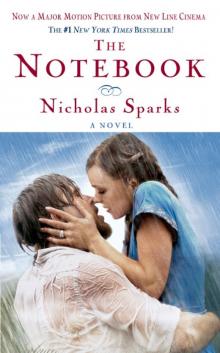 The Notebook
The Notebook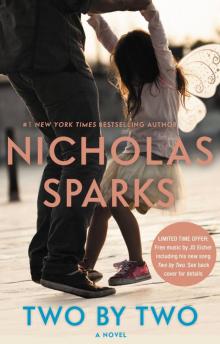 Two by Two
Two by Two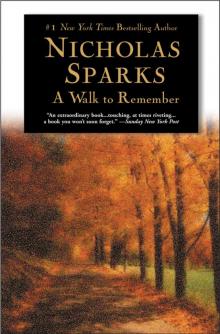 A Walk to Remember
A Walk to Remember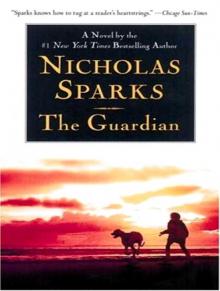 The Guardian
The Guardian Dear John
Dear John The Last Song
The Last Song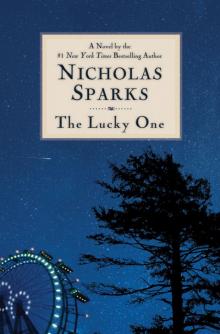 The Lucky One
The Lucky One The Wedding
The Wedding The Longest Ride
The Longest Ride Safe Haven
Safe Haven The Rescue
The Rescue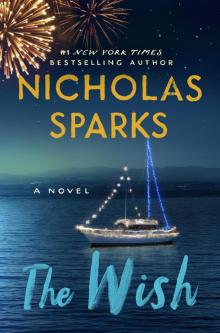 The Wish
The Wish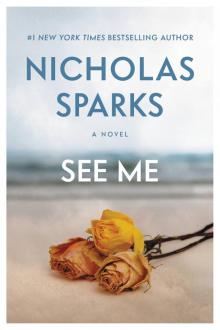 See Me
See Me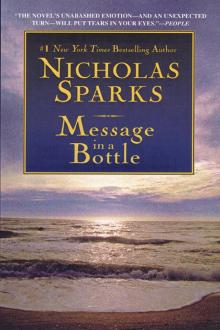 Message in a Bottle
Message in a Bottle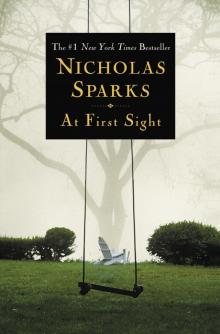 At First Sight
At First Sight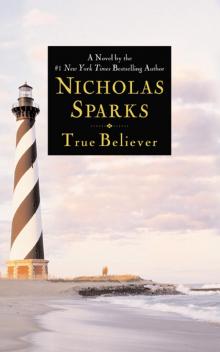 True Believer
True Believer The Return
The Return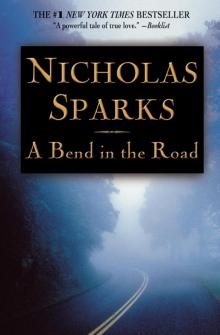 A Bend in the Road
A Bend in the Road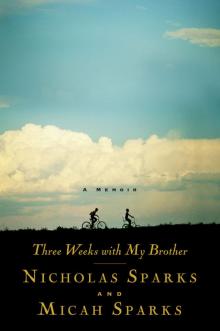 Three Weeks With My Brother
Three Weeks With My Brother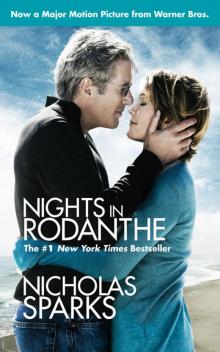 Nights in Rodanthe
Nights in Rodanthe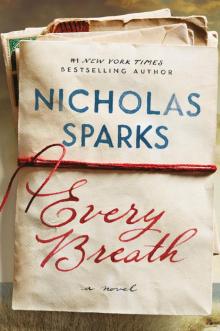 Every Breath
Every Breath